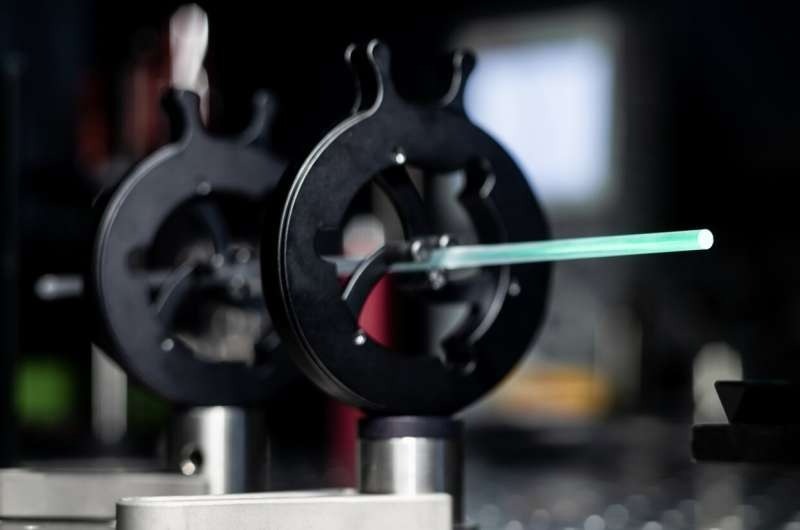A collaborative effort by researchers from Germany’s Fraunhofer IOF Institute and the University of New Mexico has resulted in a breakthrough. For the first time ever, they have successfully cooled silica glass by a remarkable 67 K using a special laser cooling technique. The details of this research have been published in the scientific journal Optics Express.
 Ytterbium-doped glass rod excited by laser. Image Credit: Fraunhofer IOF
Ytterbium-doped glass rod excited by laser. Image Credit: Fraunhofer IOF
Laser light is commonly linked with heating materials for tasks like cutting, drilling, and welding, particularly in working with precision on metal or stone objects. However, under certain conditions, it is possible to cool materials using laser light radiation, a phenomenon recognized as Doppler cooling in gases. Laser radiation can also induce cooling in solids.
Lasers can achieve cooling through a process called anti-Stokes fluorescence. In this method, a laser beam excites a specific, high-purity material. The difference in energy between the absorbed laser light and the re-emitted light (fluorescence) removes heat from the material, causing it to cool.
Researchers from Fraunhofer IOF and the University of New Mexico made a significant breakthrough in laser cooling. Their study, focusing on doped silica glass, achieved impressive results.
Researchers Overcome Previous Cooling Threshold of Silica Glass Again
For years, cooling silica glass was deemed impossible. In 2019, researchers shattered this notion by demonstrating the first-ever laser cooling of ytterbium-doped silica glass.
At that time, the temperature dropped by just 0.7 K from room temperature. The precise composition of the doped material and the manufacturing process were optimized to overcome the previous cooling threshold. Furthermore, the University of New Mexico's excitation lasers were refined in close cooperation with Fraunhofer IOF scientists.
Consequently, the scientists have now accomplished a fresh record-breaking cooling: The researchers demonstrated a temperature drop of 67 K from room temperature in just two minutes by exposing a ytterbium-doped silica rod to radiation from an excitation laser with a power of 97 watts and a wavelength of 1,032 nanometers
Fiber-Like Material Opens Up New Potentials for Application
This new development opens up the possibility of developing novel, ultra-stable lasers and low-noise amplifiers for quantum experiments or precision metrology in the future. The improved procedure can also progress vibration-free cooling and create new opportunities for cryomicroscopy and gamma spectroscopy applications in materials analysis and medical diagnostics.
The material’s possible application in fibers is especially intriguing. With this new process, high-performance fiber lasers without the restricting effects of thermal instability may be developed in the future.
The new procedure is a major step forward in laser cooling, but theoretical calculations by the experts indicate that it does not represent the maximum temperature reduction achievable with laser light to date.
Journal Reference:
Topper, B., et al. (2024) Laser cooling ytterbium doped silica by 67 K from ambient temperature. Optics Express. doi.org/10.1364/OE.507657